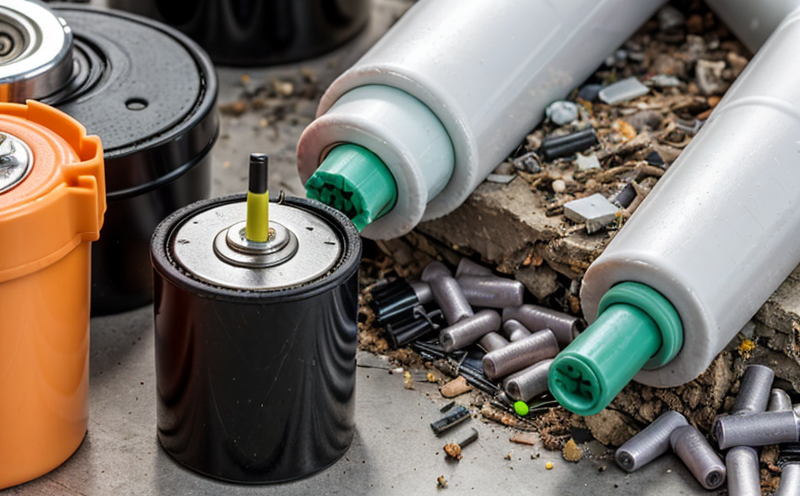IEC 62991 End-of-Life Battery Management and Recycling Testing
The IEC 62991 standard provides a comprehensive framework for managing end-of-life (EOL) batteries, ensuring their safe disposal while minimizing environmental impact. This service focuses on the critical aspects of EOL battery management, emphasizing recycling processes that comply with international standards to protect human health and the environment.
The lifecycle of batteries does not end when they no longer meet performance expectations for their intended use. Proper management involves a series of steps: recovery, disassembly, and recycling. IEC 62991 outlines best practices for these processes, ensuring that valuable materials are reclaimed without causing harm to the environment.
During this testing procedure, we follow rigorous protocols to ensure compliance with international standards such as ISO/IEC 62991:2014. These tests include a thorough examination of battery components and their performance under various conditions relevant to recycling processes. We use state-of-the-art equipment to assess the integrity of batteries at different stages of decomposition, identifying potential hazards early on.
The testing process begins with careful disassembly of EOL batteries into individual cell assemblies or modules. This step allows for precise measurement of key parameters like voltage, internal resistance, and capacity retention. Once isolated, each component undergoes detailed analysis to determine its suitability for reuse or further processing.
A critical aspect of this service is the evaluation of battery materials for their recyclability. Using advanced spectroscopic techniques, we analyze trace elements within batteries to identify valuable metals like lithium, cobalt, nickel, and copper that can be recovered efficiently through hydrometallurgical methods. Our facilities are equipped with specialized instruments capable of detecting even minute concentrations of these essential resources.
Furthermore, our laboratory adheres strictly to environmental regulations when handling hazardous materials during testing. By following strict protocols for waste management, we ensure that no harmful substances are released into the environment throughout any stage of this process. Additionally, we employ sustainable practices wherever possible, minimizing resource consumption and energy usage in our operations.
This comprehensive approach ensures not only compliance with international standards but also promotes responsible stewardship of resources. Our team of experts works closely with clients to understand their specific needs and challenges, tailoring each project to meet those requirements effectively.
Applied Standards
The IEC 62991 standard is widely recognized for its role in promoting sustainable practices throughout the entire battery lifecycle. It covers all aspects from design through production, use, and final disposal or recycling of batteries. Specifically relevant sections include:
- IEC 62991-1: General requirements.
- IEC 62991-2: Disassembly methods for EOL batteries.
- IEC 62991-3: Sorting and classification of battery materials.
- IEC 62991-4: Recovery techniques.
These standards provide clear guidelines on how to safely manage EOL batteries, ensuring that all stakeholders—from manufacturers to consumers—are aware of their responsibilities regarding sustainable practices. Compliance with these regulations helps protect both human health and the environment while fostering innovation in green technology solutions.
Industry Applications
Battery recycling is becoming increasingly important as demand for portable electronics continues to grow worldwide. Here are some key applications where IEC 62991 plays a crucial role:
- Energy Storage Systems (ESS): Reusing valuable metals extracted from recycled batteries can extend the lifespan of ESS, reducing costs associated with raw material procurement.
- Vehicle Manufacturers: Automakers are integrating second-life batteries into electric vehicle fleets after they reach end-of-use. This practice not only extends battery life but also reduces e-waste.
- Consumer Electronics Companies: Many tech companies have committed to reducing their carbon footprint by incorporating recycled materials into new products.
- Battery Manufacturers: By recycling EOL batteries, manufacturers can source raw materials more sustainably, enhancing supply chain resilience.
In addition to these commercial applications, government initiatives worldwide are promoting battery recycling through policies that encourage compliance with international standards like IEC 62991. This ensures consistent quality across recycled products and fosters trust among consumers regarding environmental responsibility.
Customer Impact and Satisfaction
Our clients benefit significantly from our expertise in IEC 62991-compliant battery recycling services:
- Economic Savings: By reusing recovered materials instead of purchasing new raw materials, companies can reduce operational costs.
- Sustainability Gains: Implementing best practices outlined by the standard contributes positively to corporate social responsibility (CSR) initiatives aimed at reducing waste and conserving natural resources.
- Regulatory Compliance: Ensuring adherence to stringent environmental regulations helps avoid penalties associated with non-compliance.
- Innovation Opportunities: Access to diverse sources of raw materials stimulates product development, leading to more efficient designs and improved performance metrics.
We strive to exceed expectations by providing accurate, reliable test results backed by robust documentation. Our commitment to quality is reflected in the numerous successful projects we’ve completed for industry leaders across various sectors.





